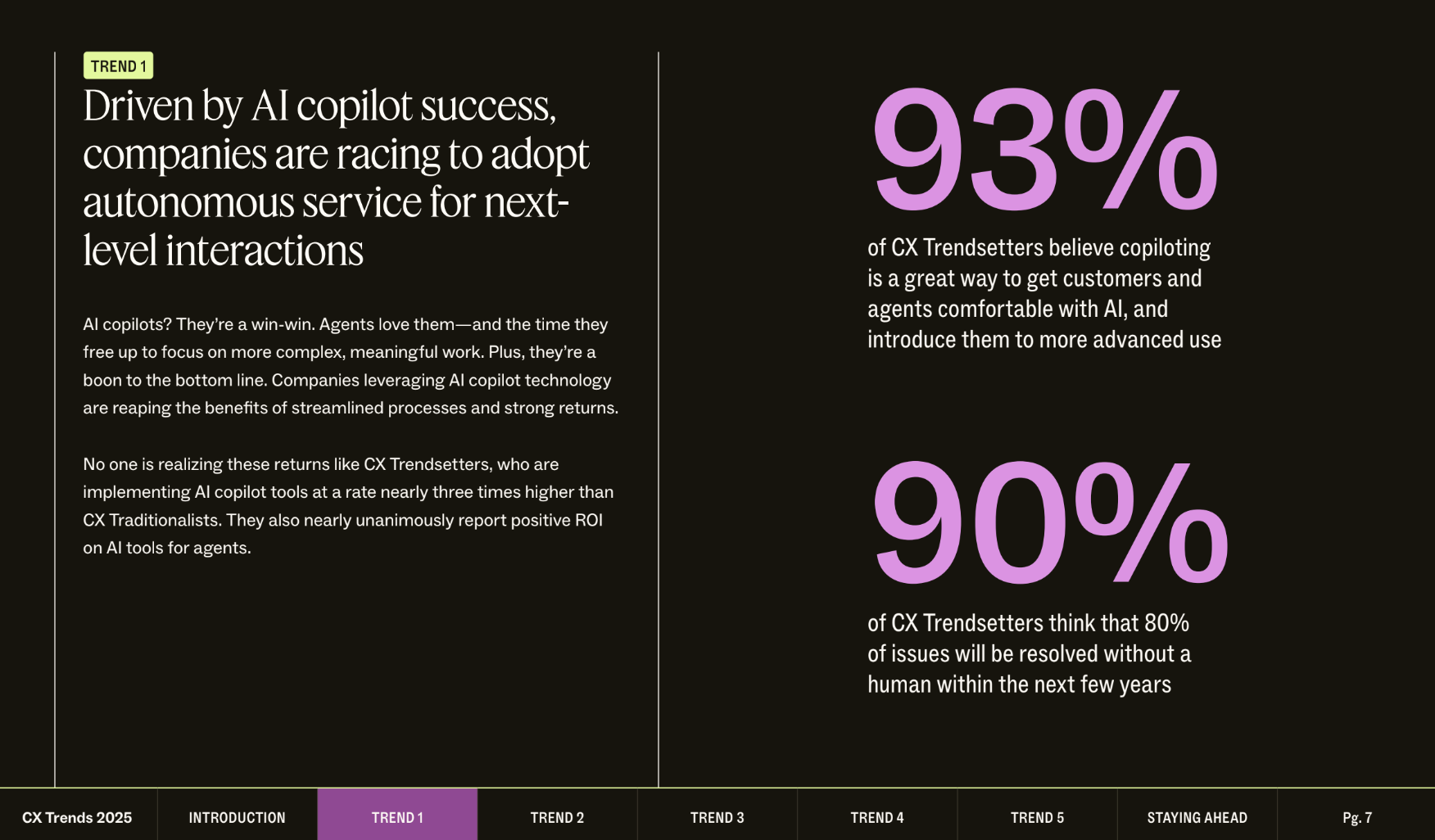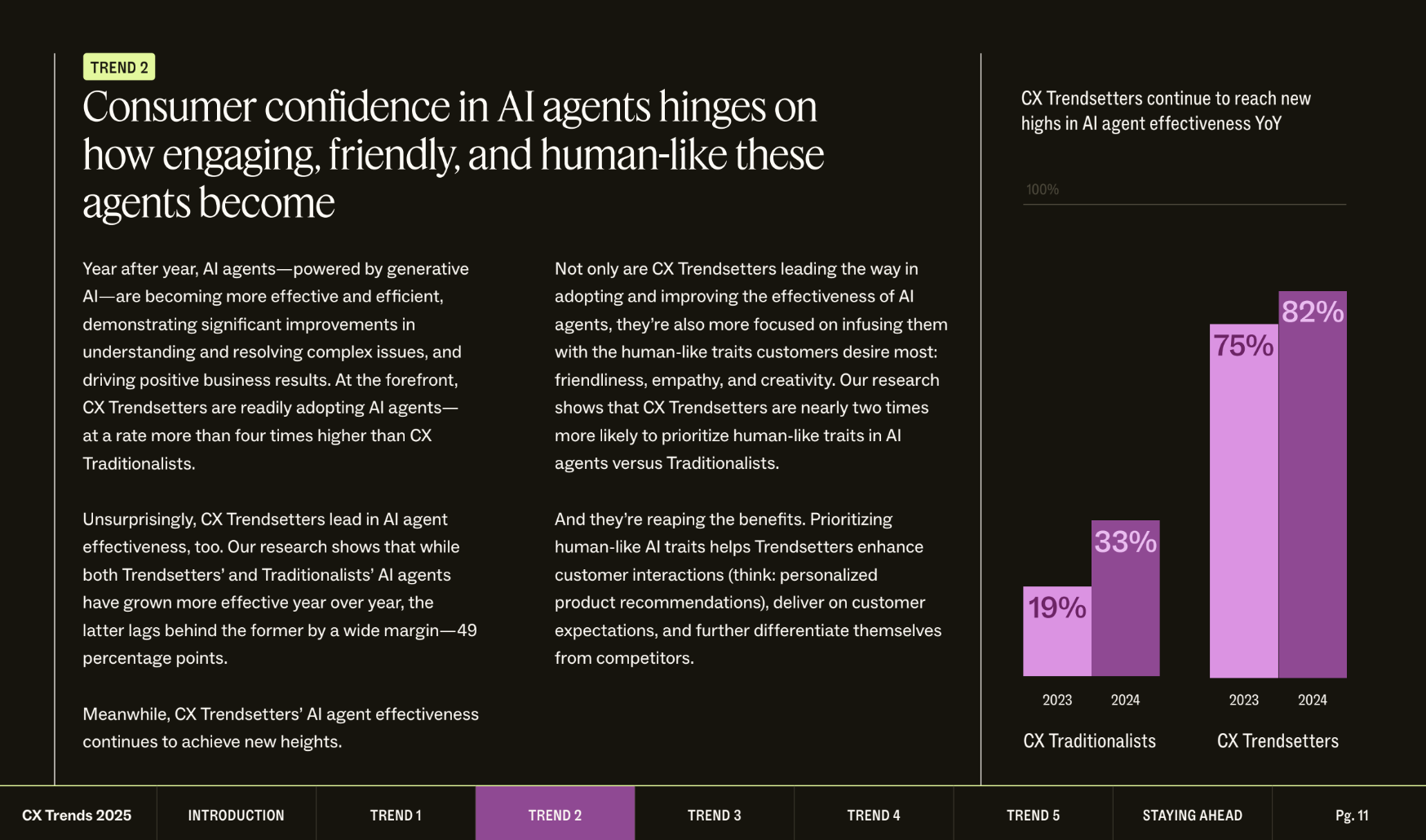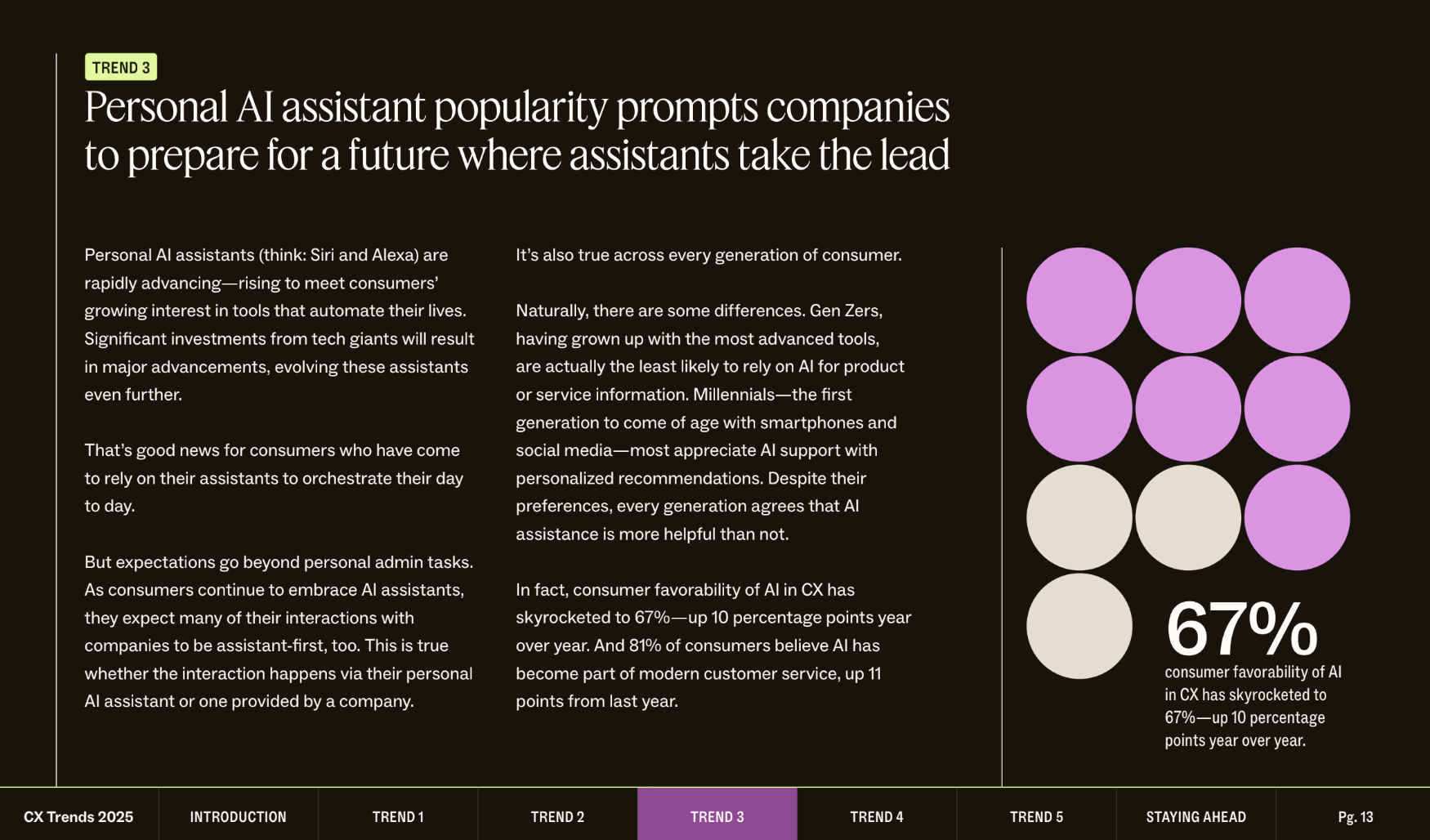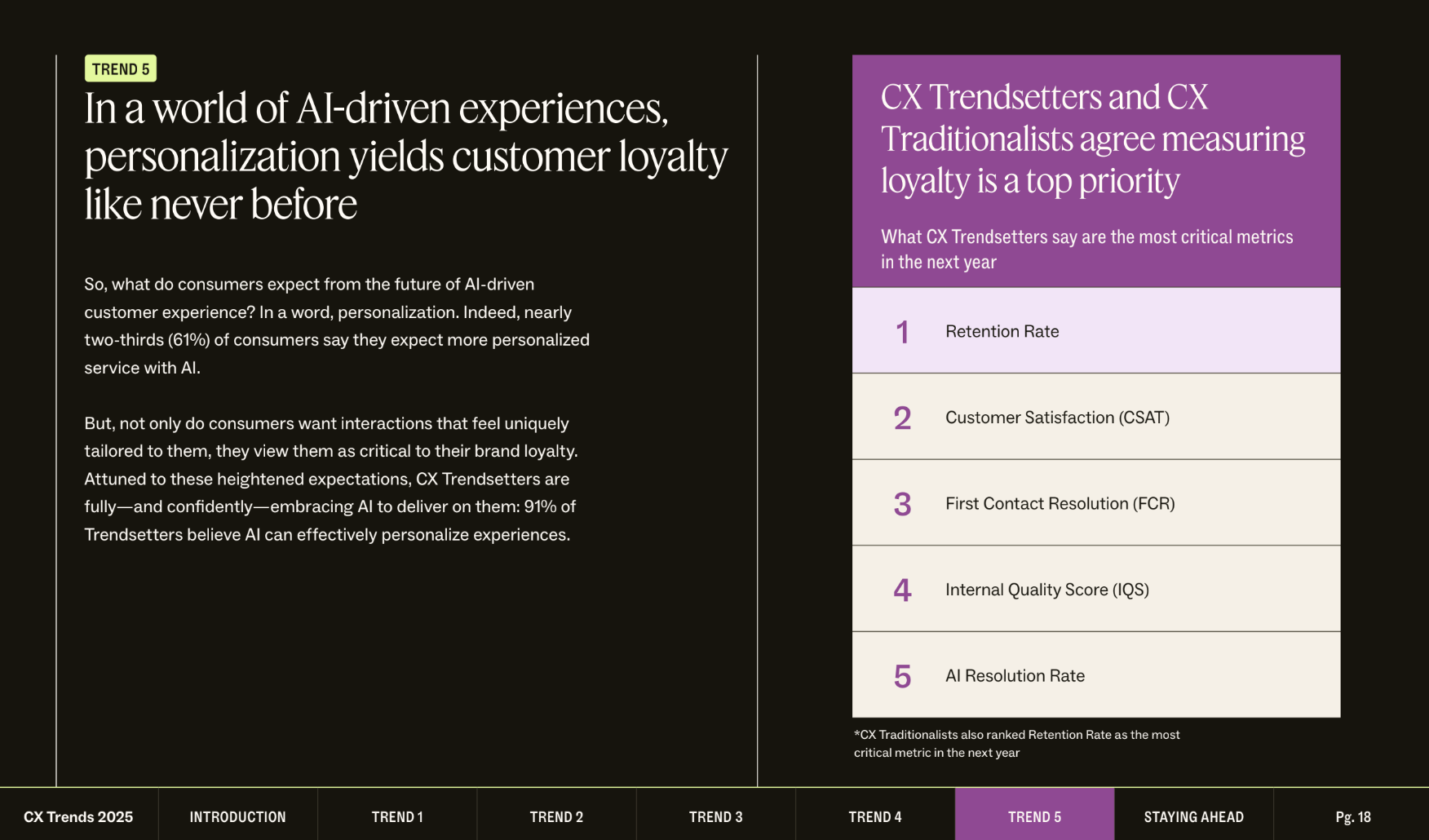In the year 2000, during the Analogue era, customer behavior shifted from face-to-face interactions to the use of telephone systems. By 2007, we welcomed the Digital era, where customers had multiple channels to reach brands, leading to the rise of the Omnichannel trend—integrating all customer touchpoints, both offline and online, to deliver a seamless experience.
Now it’s 2025. AI technology is ushering in a new era of rapidly evolving customer expectations, more profound and faster than any previous tools. Customers demand speed, precision, and highly personalized service.
This forces us to rethink what “good service” means and how we can deliver it effectively.

Customer Experience Trends Report 2025
For over seven years, Zendesk has conducted research on customer experience (CX) trends. This year’s report draws insights from over 5,000 consumers and more than 5,500 business leaders across 22 countries—including APAC.
For 2025, the findings highlight five key trends:

Trend 1: Companies are rapidly adopting AI copilots and autonomous services to elevate customer interactions
93% of CX Trendsetters believe AI Copilots are an excellent way to help both customers and agents get comfortable with AI, serving as a smooth entry point for integrating AI into broader operations.
90% of CX Trendsetters anticipate that within the next few years, 80% of customer issues will be resolved without human intervention.
An interesting statistic: the use of Shadow AI (unapproved external AI tools within companies) surged 250% this year compared to last year. The industries with the highest Shadow AI adoption are travel and manufacturing.

Trend 2: Consumer trust in AI agents depends on their ability to interact naturally, display friendliness, and feel human-like
As consumers increasingly use AI in daily life, they expect AI agents to do more than just respond quickly and accurately. Future AI development must focus on creating positive interactions, friendliness, and human-like communication. Achieving this will differentiate brands and leave lasting impressions.
For example, Siemens’ finance department successfully doubled its efficiency using Zendesk AI agents. These agents not only responded instantly to customer requests—such as sending invoices—but also predicted customer needs in advance.

Trend 3: The rise of Personal AI Assistants pushes companies to prepare for a future where AI leads the way
Consumers are more familiar with AI assistants like Siri and Alexa, particularly Gen Y (Millennials), the first smartphone and social media generation, who find AI assistants make life easier.
Confidence in AI assistants varies by generation:
Baby Boomers (60+): Prefer AI for tracking shipments.
Gen X (45-59): Trust AI to manage appointments and schedules.
Millennials (30-44): Prefer AI for personalized information and services.
Gen Z (18-29): Comfortable with AI for financial transactions.
As consumer trust and reliance on AI grow, companies must adapt to an era where AI assistants lead interactions. Initially, AI may assist with emails or in-app messages alongside human agents, but over time, customer service channels must evolve to fully integrate AI assistants that communicate directly with company systems, minimizing conflicts and reducing the need for live agents.
Some companies are already better prepared for this shift. By 2027, almost 87% of CX Trendsetters plan to design experiences where AI assistants play a key role throughout the customer journey. Companies that adapt quickly will deliver smooth, convenient, and seamless experiences, while those that lag risk being left behind.

Trend 4: Voice AI will become more popular
Natural-sounding Voice AI makes consumers feel their “voice is heard” at every brand touchpoint.
Advanced Voice AI assistants—such as ChatGPT’s voice messaging feature—are capturing consumer interest. Surveys show:
51% of consumers have interacted with advanced Voice AI.
60% are eager for companies to adopt this technology more widely.
This trend proves that Voice AI is no longer futuristic—it’s a key driver for elevating customer service experiences.

Trend 5: AI will play a pivotal role in building customer loyalty
61% of consumers expect AI to provide more personalized service. They view this personalization as a crucial factor in earning their brand loyalty. 91% of CX Trendsetters believe AI can effectively deliver highly personalized experiences.
Key CX metrics for 2025, according to CX Trendsetters:
- Retention Rate – Keeping customers engaged
- Customer Satisfaction (CSAT) – Overall customer happiness
- First Contact Resolution (FCR) – Solving issues on the first try
- Internal Quality Score (IQS) – Internal service quality
- AI Resolution Rate – Percentage of cases resolved by AI

Level Up CX with the Right Platform
To align customer experiences with evolving behaviors, brands need not only trend-driven strategies but also the right platform.
Zendesk has consistently been a leader in customer experience innovation. In 2025, Zendesk enhanced its AI capabilities to help businesses deliver experiences that are personalized, seamless, and efficient:
Zendesk users saw a 17% increase in customer satisfaction due to improved service delivery.
Agent efficiency rose by 20%, enabling faster and more effective customer request handling.
Zendesk’s automated service tools reduced cost per ticket by 40%, optimizing operational costs.
Overall management costs dropped by 10%, helping businesses maximize ROI.
Zendesk remains a top choice for businesses seeking to improve CX, backed by recognition such as the Top Most Used Martech Award for Customer Service this year.

Suggested Fou You
Discover more insights in the full CX Trends 2025 Report – Download here
What is Zendesk and how can it transform your business? Read the summary here
Explore Zendesk packages and pricing – Click here
Talk to our sales team and get a free consultation from our experts here

About the author
Dr. Varanyu Suchivoraphanpong is currently the Founder & CEO of DEMETER ICT, a Premier Partner of Google and Zendesk in the APAC region. The company has the largest customer base for Google and Zendesk services in APAC including Greater China, with a combined total of more than 4,600 business customers. Dr. Varanyu has over 25 years of experience in information technology, having previously held senior executive positions in major organizations including banks, IT service providers, and business consulting firms. Dr Varanyu obtained his PhD in Computational Mechanic from Imperial College London.





